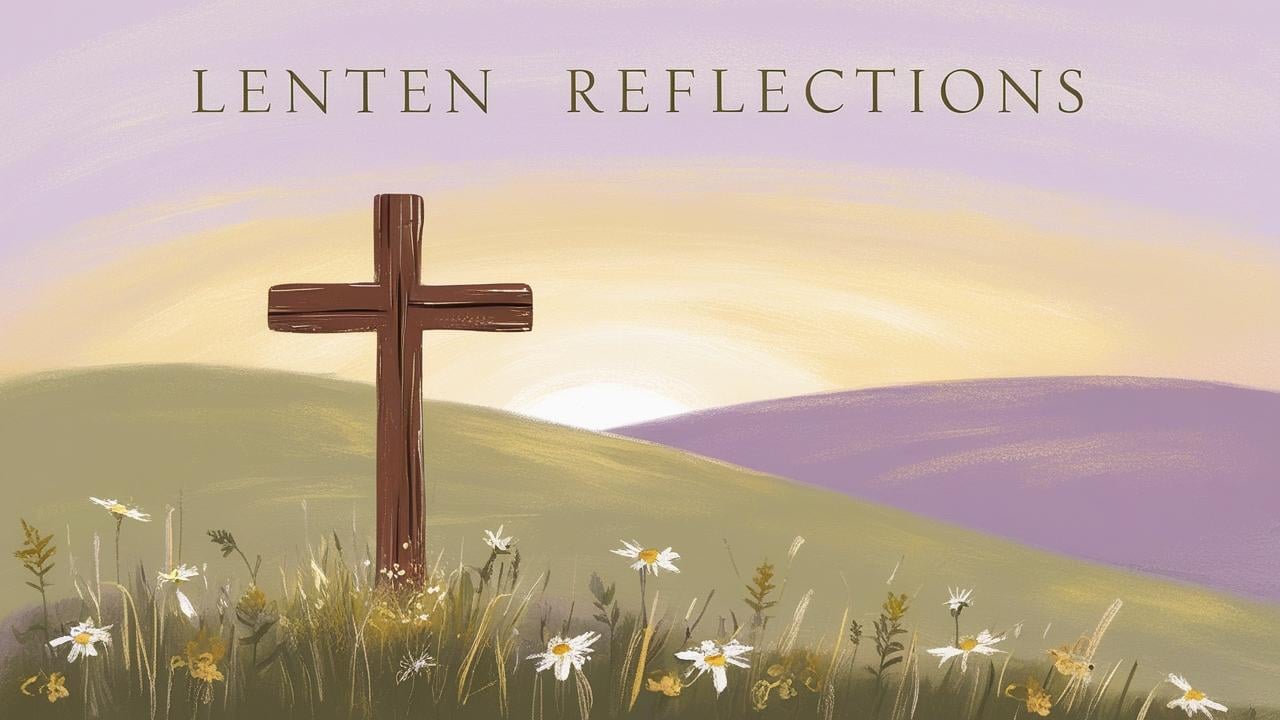Each week during Lent, members of the Newman University community share personal reflections that illuminate their spiritual paths through this sacred season of preparation. May these brief meditations help you draw closer to Christ during your Lenten journey.
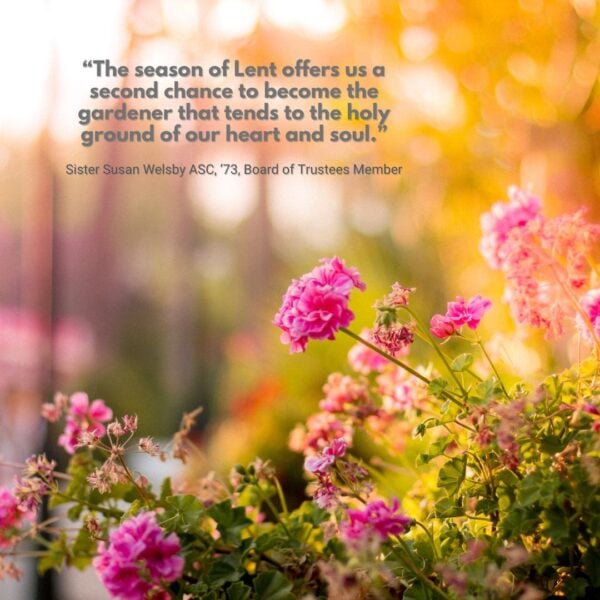
March 23 Third Sunday of Lent
(Exodus 3:1 – 8, 13 – 15; 1 Cor 10:1 -6. 10 – 12; Luke 13:1 – 9)
In the reading from Exodus, we hear the story of Moses tending sheep in the desert. I imagine the boredom while being a shepherd suggests anything unusual would likely capture one’s attention. Moses’ curiosity channels him to “go over to look at this remarkable sight.” When Moses nears the bush, God informs him that he stands on holy ground. As the story continues, Moses is called to tend to the Israelites and lead God’s people out of their Egyptian slavery.
In Corinthians, Paul references the journey of the Israelites. Although they had been set free and led across the sea, the journey was not exempt of difficulties, complaints and, in some cases, choices that led to brokenness in the relationship with their God. Paul uses this reminder to serve as a warning that attention to our relationship with God must be tended to with care.
The parable in Luke’s Gospel passage provides us a recipe during this season of Lent. The owner of the fig tree has reached a frustration point with its lack of productivity. The gardener proposes the owner allow the tree to be tended to for another year. The season of Lent offers us a second chance to become the gardener that tends to the holy ground of our heart and soul. The productivity of our fruit is determined by the manner of cultivation and the grade of fertilizer we select. How can I best tend to my fig tree, planted in holy ground, to bear fruit in the future?
Sister Susan Welsby ASC, ’73, Board of Trustees Member

March 24 Monday, Third Week of Lent
(2 Kings 5:1 – 15; Luke 4:24 – 30)
A recurring theme throughout Scripture is the striking and often unsettling contrast between the Divine and our humanity. Within this vast disparity, we begin to grasp the truth of the words, “For my thoughts are not your thoughts, neither are your ways my ways” (Isaiah 55:8). It’s no wonder, then, that the abundant life to which God calls us can seem irrational, unsafe, or even foolish by human standards—because it is. The relationship we were created for requires radical trust, deep faith, and a willingness to step beyond what feels logical or secure. Though God’s ways and methods challenge our natural instincts, they remain the only true path to our ultimate restoration, healing, and transformation.”
Brian Epperson, Professor of Business
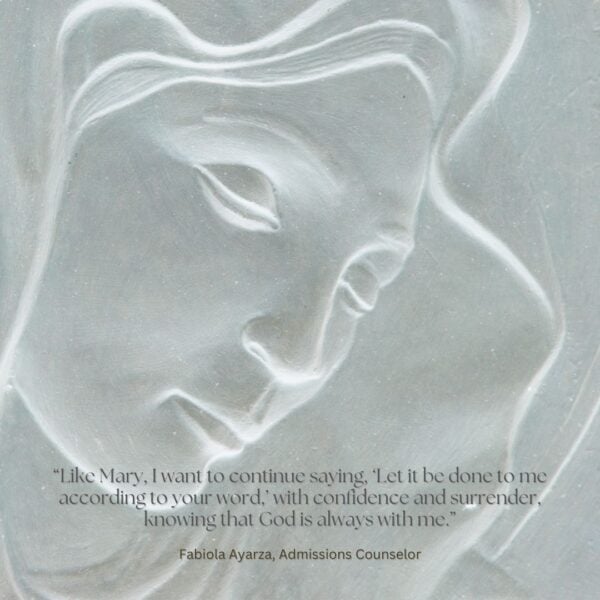
March 25 Tuesday, The Feast of the Annunciation
(Isaiah 7:10 – 14, 8:10; Hebrews 10:4 – 10; Luke 1:26 – 38)
Since I was young, I have firmly believed that with faith and perseverance, God protects us and guides us on the path to our destiny and salvation. I have never doubted God’s plan or resisted His will out of fear or uncertainty. I have always felt that God has a purpose for me and that by trust, everything falls into place at the right time.
However, I have experienced fear, especially when thinking about loneliness or the possibility of bad things happening and not being sure what to do. Even so, instead of resisting, I have found the strength to face those fears, knowing that God never abandons me. God’s presence has given me peace and the courage to move forward, trusting that everything happens according to His will. Like Mary, I want to continue saying, “Let it be done to me according to your word,” with confidence and surrender, knowing that God is always with me.
Fabiola Ayarza, Admissions Counselor
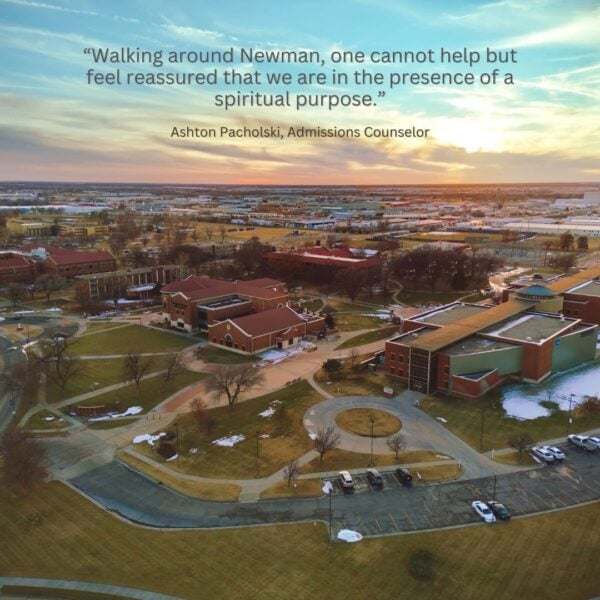
March 26 Wednesday, Third Week of Lent
(Deuteronomy 4:1, 5 – 9, Matthew 5:17 – 19)
Reflecting on Deuteronomy…I’m grateful to work within a university that keeps faithful to its identity and mission. Walking around Newman, one cannot help but feel reassured that we are in the presence of a spiritual purpose. Our obedience to God’s dutiful thesis fosters the luminous message of service for others. In the intentional ways we support and uplift the students—and leaders—of tomorrow, we are protecting our future generations. I am blessed to ask myself every morning before work: “How can I help them succeed?” And through love and mercy, God coaches me.
Ashton Pacholski, Admissions Counselor
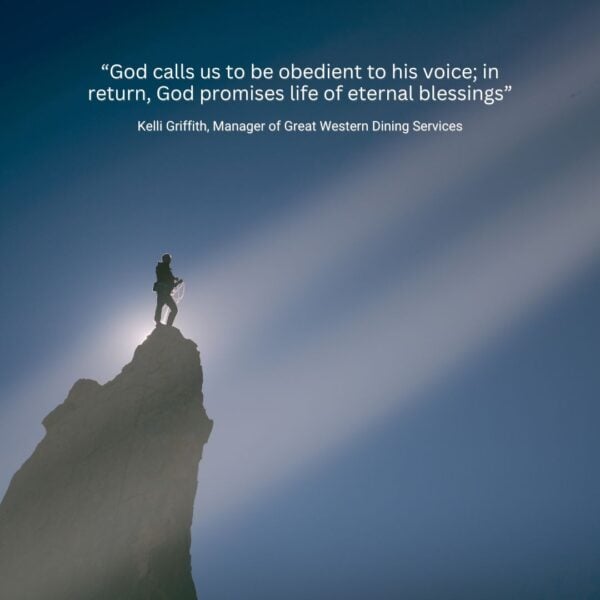
March 27 Thursday, Third Week of Lent
(Jeremiah 7:23 – 28; Luke 11:14 – 23)
In Jeremiah, God calls us to be obedient to his voice; in return, God promises life of eternal blessings. And in Luke, God makes it very clear that even if we are on the fence on choosing him or the devil, we are not on his side. Stand strong and resist the temptations of the devil.
May this Lent help us reflect on all the wonderful gifts God has given us. May we not be selfish and tempted. May we seek to fill our lives with God’s guidance, grace, and love. All our Lenten sacrifices will be rewarded this Easter and our souls be full of God’s love.
Kelli Griffith, Manager of Great Western Dining Services

March 28 Friday, Third Week of Lent
(Hosea 14:1 – 9; Mark 12:28 – 34)
Love – the readings today are all about love! God tells us in Hosea, “I will love them freely.”
Unbelievable! Amazing! The God who created everything good, including us, loves us freely despite our sinfulness and our creating idols in our lives. Jesus reminds us, “you shall love the Lord your God” with our total selves. Nothing is to be held back in loving God, myself and my neighbor. We simply sit in quiet and let the awesomeness of these truths permeate our being with gratitude and resolve. “Let the one who is wise understand these things.”
Anonymous Alumna

March 29 Saturday, Third Week of Lent
(Hosea 6:1 – 6; Luke 18:9 – 14)
These passages challenge me to personally examine how I am cultivating my faith in outward expression – am I being sincere and prioritizing love and mercy over religious motions? As someone scientifically minded, it is often easy for me to fall into patterns, evaluating analytically how I will love and serve others, rather than how they would best be served and cared for. Both the texts in Hosea and Luke remind me that I am to serve all people in Christ’s love and with compassion, not just how it is easiest for me.
Elizabeth Peuchen-Allison ‘14
For all the 2025 reflections, please visit the Lent page on the Newman University website.
